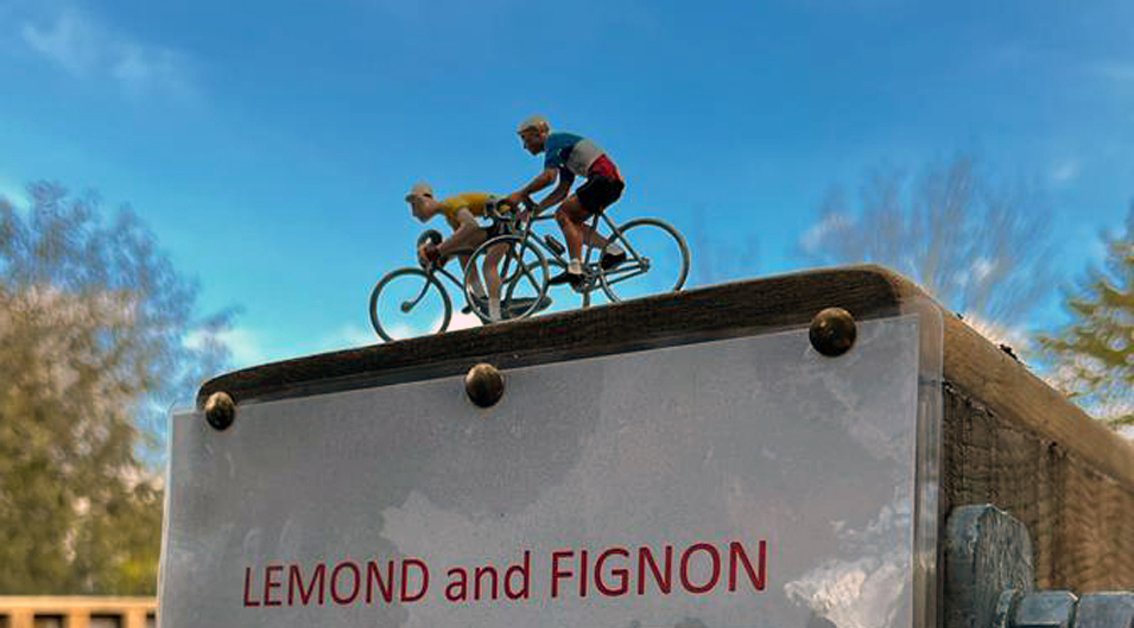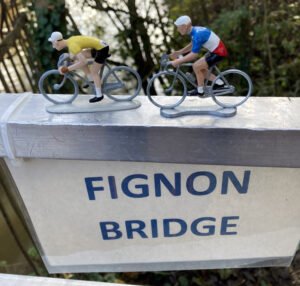Oxford bike bridges and the Tour de France

By Jonny Ives
Jonny is a Cyclox member
The announcement of the route of the next Tour de France does not usually resonate deeply in Oxford. This year, details of the 2024 Tour may ring a few more bells than usual for cyclists using the newly repaired Marston cycle path. Read on to find out why.
For the first time since 1903, when the Tour was first raced, the banks of the Seine will not be a feature of the event. For next year’s race the organisers of the Tour de France have broken with some long-standing traditions in order to ease the pressure on Paris, which will be preparing to host the 2024 Olympic Games.
Changes for 2024
The 2024 Tour will begin in Florence – the first time that the race has held its Grand Depart in Italy. It will finish in Nice – the first time the Tour has finished anywhere other than Paris.

It will also be the first time since 1989 that the final stage will be properly competitive (and include a time trial) rather than largely ceremonial. The last time this happened, 35 years ago, Greg Lemond beat Laurent Fignon to the yellow jersey by 8 seconds after 3 weeks and thousands of kilometres of racing.
Until recently, few people knew that this most famous of Tour victories (and defeats) was commemorated on Oxford’s Marston cycle path. As revealed in September by Cyclox Chair Alison Hill, the two bridges that were rebuilt over the summer are named after Fignon and Lemond. This is because of the 8-second journey time between the bridges in question. Eight seconds to cross a bridge, eight seconds to go down in history.
Who were Fignon and Lemond?
Born in Paris in 1960, Laurent Fignon was not quite 50 years old when he died in 2010. It was a life ended far too soon by cancer, a life and a career that, for all his many victories and achievements, Fignon admitted would be defined by that one afternoon in Paris.
Fignon’s autobiography begins with a conversation with a Parisian taxi driver: “Ah, I remember you: you’re the guy who lost the Tour de France by 8 seconds!” the cabbie says.
“No monsieur,” replies Fignon. “I’m the guy who won the Tour twice.”
And he did much more besides. Laurent Fignon won two Tours de France – in 1983 and 1984 – the Giro D’Italia (Italy’s own 3-week grand tour) in 1989, numerous individual stages of the grand tours of France, Italy and Spain, plus some of the sport’s most celebrated and hardest 1-day races. As a double Tour winner, and one of the very few to have won the Tour at their first attempt, Fignon earned a place in professional cycling’s pantheon and the respect of everyone who ever turned a pedal.
1989 was the second of Greg Lemond’s three Tour victories. Now in his early 60s, Lemond continues to push the boundaries of cycling technology via the bike company that bears his name.
Commemorating the champions

The final stage of the 2024 Tour takes place on 21 July and the story of Laurent Fignon and Greg Lemond will be told and retold for audiences around the world. In the absence of Le Professeur (a nickname that owed as much to Fignon’s glasses and elegant demeanour as his university studies) there will be more than a little poignancy to go with the excitement.
In Oxford we will continue to commemorate two great champions by riding and walking over two modest bridges. Some name plates would be a nice touch. The campaign starts here.
Image credits
Fignon bridge repair: © Hannah Jones (cc-by-sa/2.0)
Lemond and Fignon signs: Jonny Ives
